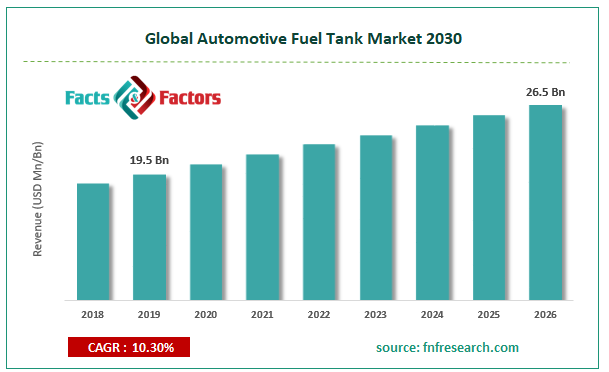04-Mar-2020 | Facts and Factors
Findings from Facts and Factors report “Automotive Fuel Tank Market By Tank Capacity (>70L, 45L–70L, and <45L), By Vehicle Type (Passenger Cars and Commercial Vehicles), By Material Type (Steel, Aluminum, and Plastic), By CNG Tank Type (Type 4, Type 3, Type 2, and Type 1), By Propulsion Type (Hydrogen, NGV, Hybrid, and ICE), And By Region: Global Industry Outlook, Market Size, Business Intelligence, Consumer Preferences, Statistical Surveys, Comprehensive Analysis, Historical Developments, Current Trends, and Forecasts, 2020–2026” states that the global automotive fuel tank market in 2019 was exceeded USD 19.5 Billion. The market is expected to grow at a CAGR of around 4.5% and is anticipated to reach close to USD 26.5 Billion by 2026.

The automotive fuel tank is a robust and insulated container used to store the flammable fluids safely. It is an essential component of a vehicle’s propulsion system, which stores the fuel and slowly releases it into an engine for combustion. Some of the key drivers escalating the growth of the global automotive fuel tank market are the considerable increase in the production rate of gasoline vehicles across the different regions along with the phenomenal increase in the demand for vehicles in several countries from the last few decades owing to the rising disposable incomes. Moreover, the rapidly escalating industrialization along with the escalating global trade has propelled the commercial vehicles market, which in turn is offering opportunities for the automotive fuel tank manufacturers to expand their businesses, thereby driving the global automotive fuel tank market. However, the swift emergence of the electric vehicles market is likely to impede the growth of the automotive fuel tank market.
Browse the full “Automotive Fuel Tank Market By Tank Capacity (>70L, 45L–70L, and <45L), By Vehicle Type (Passenger Cars and Commercial Vehicles), By Material Type (Steel, Aluminum, and Plastic), By CNG Tank Type (Type 4, Type 3, Type 2, and Type 1), By Propulsion Type (Hydrogen, NGV, Hybrid, and ICE), And By Region: Global Industry Outlook, Market Size, Business Intelligence, Consumer Preferences, Statistical Surveys, Comprehensive Analysis, Historical Developments, Current Trends, and Forecasts, 2020–2026" report at https://www.fnfresearch.com/global-automotive-fuel-tank-market-by-tank-capacity-622
Plastic automotive fuel tanks will witness substantial demand in the automotive fuel tank market
Automakers are installing plastic fuel tanks instead of metal fuel tanks in their automobiles owing to some key advantages of plastic fuel tanks such as corrosion-resistant, lightweight, highly durable, and flexible. One of the aforementioned attributes of plastic fuel tanks, i.e. lightweight, also positively affects the performance of vehicles.
The 45L–70L capacity segment may dominate the market based on the anticipations over average fuel capacity of vehicles
The majority mini SUVs, mid-sized sedans, and hatchbacks are equipped with a fuel tank of greater than 45L capacity. All these vehicle types are under the passenger car category. Hence, the extensively rising production of the vehicle types with the fuel capacity of 45L–70L in China, Germany, Japan, India, Spain, and France is anticipated to propel the demand for cars falling under the specified fuel capacity segment.
Report Scope
Report Attribute |
Details |
Market Size in 2019 |
USD 19.5 Billion |
Projected Market Size in 2025 |
USD 26.5 Billion |
CAGR Growth Rate |
10.3% CAGR |
Base Year |
2020 |
Forecast Years |
2020-2026 |
Key Market Players |
Magna International, Yachiyo, Textron, SMA Serbatoi S.p.A., TI Fluid Systems, Fuel Total Systems, Plastic Omnium, Unipres, and YAPP, among others. |
Key Segment |
By Tank Capacity, By Vehicle Type, By Material Type, By CNG Tank Type, By Propulsion Type, By Region |
Major Regions Covered |
North America, Europe, Asia Pacific, Latin America, and the Middle East & Africa |
Purchase Options |
Request customized purchase options to meet your research needs. Explore purchase options |
Some of the key players driving the global automotive fuel tank market are Magna International, Yachiyo, Textron, SMA Serbatoi S.p.A., TI Fluid Systems, Fuel Total Systems, Plastic Omnium, Unipres, and YAPP, among others.
This report segments the global automotive fuel tank market as follows:
Global Automotive Fuel Tank Market: Tank Capacity Segmentation Analysis
Global Automotive Fuel Tank Market: Vehicle Type Segmentation Analysis
- Passenger Cars
- Commercial Vehicles
Global Automotive Fuel Tank Market: Material Type Segmentation Analysis
Global Automotive Fuel Tank Market: CNG Tank Type Segmentation Analysis
- Type 4
- Type 3
- Type 2
- Type 1
Global Automotive Fuel Tank Market: Propulsion Type Segmentation Analysis
Global Automotive Fuel Tank Market: Regional Segmentation Analysis
- North America
- Europe
- Germany
- The UK
- France
- Spain
- Italy
- Rest of Europe
- Asia Pacific
- China
- Japan
- India
- South Korea
- Southeast Asia
- Rest of Asia Pacific
- Latin America
- Brazil
- Mexico
- Rest of Latin America
- Middle East & Africa
- GCC
- South Africa
- Rest of Middle East & Africa
About Us:
Facts & Factors is a leading market research organization offering industry expertise and scrupulous consulting services to clients for their business development. The reports and services offered by Facts and Factors are used by prestigious academic institutions, start-ups, and companies globally to measure and understand the changing international and regional business backgrounds. Our client’s/customer’s conviction on our solutions and services has pushed us in delivering always the best. Our advanced research solutions have helped them in appropriate decision-making and guidance for strategies to expand their business.
Contact Us:
Facts & Factors
Global Headquarters
Level 8, International Finance Center, Tower 2,
8 Century Avenue, Shanghai,
Postal - 200120, China
Tel: +86 21 80360450
Email: [email protected]
Web: https://www.fnfresearch.com



